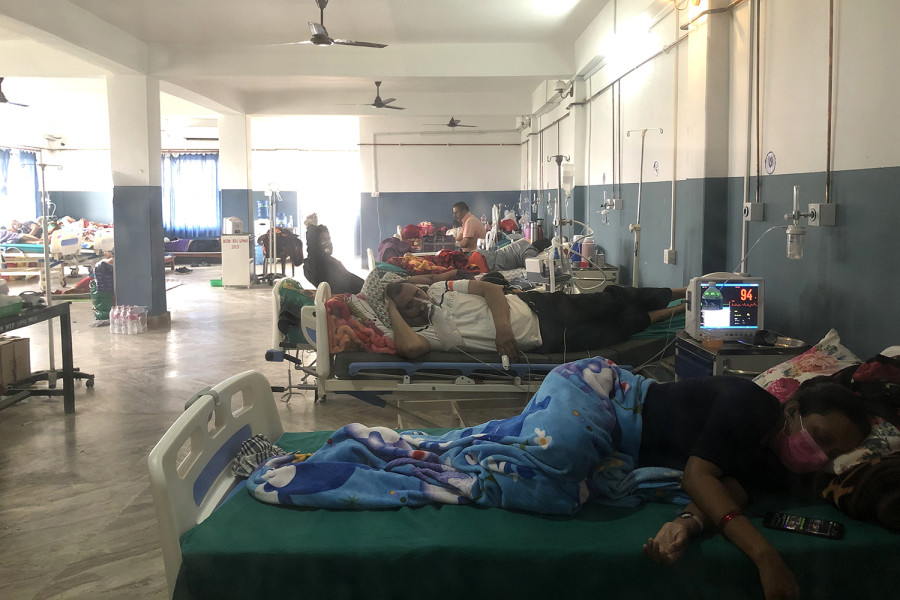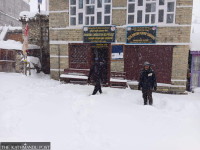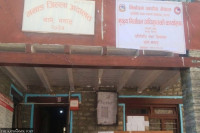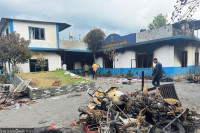Gandaki Province
Covid-19 patients in Pokhara face difficulty getting treatment
Most government hospitals across Gandaki Province and Covid-19 designated hospitals in the city face a hard battle against the virus in light of a shortage of health personnel.
Deepak Pariyar
A week ago, a 61-year-old resident of Hospitalchok in Pokhara went to Birgunj to meet her son. In the next few days at Birgunj, she started running a fever and complained of nausea. Her son, a pharmacist, consulted with a doctor and put her on medication.
She returned to Pokhara a couple of days later after her health improved. But she soon complained of uneasiness in her chest and went to Gandaki Medical College for a check-up. The health staff at the hospital ran a Covid-19 test on her, which showed a positive result.
However, the hospital advised her to go to other hospitals citing that Gandaki Medical College was not receiving any Covid-19 patients.
On Sunday, she was taken to Sisuwa-based Tropical and Infectious Disease Hospital in Pokhara, which is run by the provincial government. Her health condition worsened and she had to be administered supplemental oxygen.
The hospital has established an Intensive Care Unit but it is yet to come into operation. Hospital authorities then advised family members of the patient to transfer her to some other hospital.
The hospital in question is one of the designated Covid-19 hospitals in Pokhara.
“The Covid-19 hospital told me to take my mother to other hospitals. Where shall I take my mother now? My mother’s health condition is worsening by the day,” said the patient’s son.
Dr Bikash Gauchan, the executive director of the hospital, says the health institution hasn’t been able to treat Covid-19 patients despite being a coronavirus-specific hospital because of delay in the operation of the ICU.
“The hospital has seven ICU beds but there’s no staff to operate the ICU,” he said. “We have two nurses who are providing treatment to over 40 Covid-19 patients.”
On Wednesday, 41 people were receiving treatment at the hospital. Among them, 20 are in critical condition.
The hospital is referring critical patients to private hospitals, which they say are more equipped to handle serious cases for treatment. However, the cost of Covid-19 treatment at private hospitals is high and beyond the reach of the poor and the lower middle class.
A Covid-19 patient in Charak Memorial Hospital, one of the private hospitals in Pokhara, has to cough up Rs 150,000 as deposit if he/she needs treatment at the ICU. Patients have to pay Rs 20,000 for a bed without oxygen or ventilator support.
There are seven ICU beds in Charak Memorial. All of the beds were occupied at the hospital as of Wednesday. The treatment cost at Mediplus Hospital and Manipal Teaching Hospital, among other private hospitals in Pokhara, is also high, making it increasingly necessary for government hospitals to be fully prepared to take in Covid-19 patients.
Out of 1,009 active cases in Gandaki Province, 727 are from Kaski alone. However, Pokhara Academy of Health Sciences, one of the government hospitals in Pokhara, started admitting Covid-19 patients from Tuesday only.
Two weeks ago, the Ministry of Health and Population had directed all hospitals across the country to allocate half of their bed capacity for Covid-19 treatment. But Pokhara Academy of Health Sciences has only allocated 45 out of 350 beds at the hospital for coronavirus patients.
Arjun Acharya, director at the hospital, says he is following the provincial government’s directive to start admitting Covid-19 patients only if beds at the Infectious Disease Hospital are fully occupied.
Three months ago, the provincial government had decided to place Covid-19 patients from all 11 districts at the Infectious Disease Hospital citing that the number of Covid-19 patients has gone down.
But since the beginning of April, Covid-19 cases have increased in Kaski, and the coronavirus-specific hospitals still are not prepared to take on the increasing caseload.
According to Dr Gauchan, the executive director of the Gandaki Medical College, the hospital is in need of at least four staff nurses to operate one ICU bed in four shifts; 28 staff nurses are needed to operate seven ICU beds.
“But we only have six staff nurses at the moment. Among them, four are newly appointed who have not arrived at the hospital yet,” he said.
According to him, the hospital is yet to appoint a medical specialist, biomedical engineer and other staff as well.
“This is mostly because of a lack of initiative from the provincial government. The government should have prioritised medical staff appointments at a time when the whole country is going through a health crisis,” Gauchan said.
At the Infectious Disease Hospital, there are only 25 health workers, including doctors and nurses, which health professionals say is not enough to provide treatment and care to a growing number of Covid-19 patients.
Meanwhile, Dr Binodbandu Sharma, director at the Provincial Health Directorate, says hospitals in Gandaki need not yet raise alarm bells about a shortage of staff.
“We have already allocated the necessary budget to add required staff at the Infectious Disease Hospital. For the time being, four staff nurses have been appointed. This will also provide some relief to the hospital,” Sharma told the Post. “There’s no need to worry as nine ICU beds have already come into operation at Pokhara Academy of Health Sciences for the treatment of Covid-19 patients.”
A shortage of human resources in the health sector has been plaguing Gandaki Province for quite some time now, with most district hospitals running ineffectively for a lack of trained staff. The Covid-19 crisis, however, has highlighted the drastic effects of the shortage.
The social development ministry of Gandaki Province invited applications to appoint some specialist doctors, including surgeons, gynaecologists and anaesthetists, among others, in November last year for 10 district hospitals and two government hospitals in Pokhara.
But not a single applicant responded to the call. Similarly, the ministry invited applications to appoint 59 doctors and health workers in February. The specialist doctors who did apply did not want to be deployed to 12 various hospitals under Gandaki Province.
The ministry again very recently invited applications for 21 posts of doctor but only nine people applied for the job.
Fast forward to today, when Covid-19 cases are at an all-time high, all 10 district hospitals and two Pokhara-based Matrishishu Miteri Hospital and Tropical and Infectious Disease Hospital have been fighting a lost battle in the treatment of Covid-19 patients for a lack of human resources.
The health authority has been struggling to operate ICU, HDU, ventilator and oxygen plants in various hospitals in the province due to the shortage of trained human resources.
The province has only one permanent specialist doctor at present. Though each district hospital in the province has the post of a specialist doctor of ninth or above level, medical officers of eight level have been working now as hospital chiefs.
Parbat District Hospital has already installed its own oxygen plant a few months ago but the plant is yet to be operated due to a lack of trained human resources.
Dr Ram Bahadur KC, chief at the hospital development and medicine service division under the ministry, said a shortage of specialist medical doctors is the main challenge facing the health sector in Gandaki Province. Specialist doctors, according to KC, are not interested in applying for jobs at government health institutions, as they get better perks and facilities in private hospitals.
“They may think that they cannot work in private hospitals once they join the government hospitals. The government should bring special packages with various facilities to attract specialist doctors in public health institutions,” said KC.
The ministry is now preparing to delegate authorities to the district hospitals to hire health workers themselves. According to KC, a proposal has been sent to the ministry to prepare a guideline allowing the district hospitals to appoint one anaesthetist or physician and two staff nurses.
“The problem of human resource shortage will be addressed to some extent once the Council of Ministers takes a decision on the guideline,” said KC.




 10.83°C Kathmandu
10.83°C Kathmandu.jpg)











